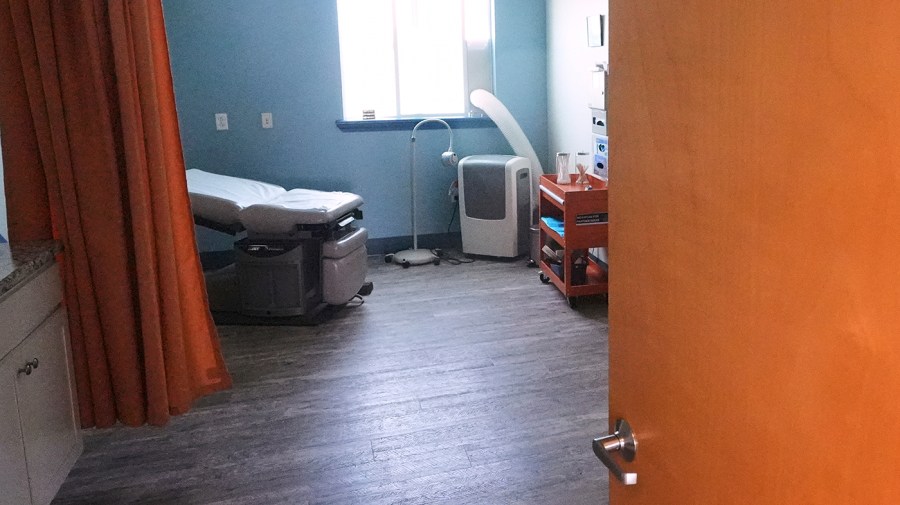Republicans are waging a multipronged campaign against abortion shield laws in blue states, hoping to force the federal government to ultimately intervene.
Legal experts say the effort will be difficult — as some states have already learned.
State abortion shield laws are meant to protect providers and patients from civil and criminal actions. Eighteen states plus the District of Columbia have an abortion shield law, according to Rachel Rebouché dean of Temple University Beasley School of Law.
Shield laws in eight of those states protect abortion providers regardless of patient location, which has helped cover health care providers who send abortion medication to telehealth patients living in states where the procedure is restricted.
Republicans are fighting the laws in court, while also pushing for a federal law that supersedes the protection.
More than a dozen GOP attorneys general recently urged congressional leadership in a letter to preempt the state laws by passing legislation that bans shield laws.
Signees include Texas Attorney General Ken Paxton (R) and Louisiana Attorney General Liz Murrill (R), both of whom have taken legal action against a New York doctor for allegedly prescribing and mailing abortion pills to women in their respective states.
Some legal experts don’t think congressional leadership will introduce legislation to preempt state abortion shield laws because it would struggle to pass.
“It’s just not realistic,” said James Bopp Jr., general counsel for the National Right to Life Committee, adding that there is not a single anti-abortion Democratic senator and at most two anti-abortion Democrats in the House.
“There is absolutely zero prospect of it passing the Senate, and it makes no sense to waste your time on things that are completely hopeless and pointless.”
Bopp said he believes that the state lawsuits challenging abortion shield laws have an objective legal merit, arguing that since each state is sovereign, no other state can regulate conduct within them. He argues that in attempting to do this, abortion shield laws deny “full faith and credit” to the state laws where these abortions occur.
Paxton has led the charge in combating these laws in court, most notably with his lawsuit against New York physician Margaret Carpenter.
His office sued Carpenter in December, accusing her of sending abortion pills to a Texas woman last year. Soon after, a Texas judge ordered Carpenter to pay more than $100,000 in penalties, but she did not respond to the lawsuit nor appear for the subsequent court hearing.
Paxton has tried twice to force a New York county clerk to file the ruling against Carpenter, but the clerk has refused, citing the state’s abortion shield laws. He is now seeking a writ of mandamus to compel the clerk, Taylor Bruck, to enforce the summary judgment and court summons.
In January, a grand jury in Louisiana indicted Carpenter for also allegedly prescribing abortion medication to a woman in the state, resulting in state authorities requesting she be extradited.
Paxton and Murrill have said that they will continue to try and press charges against Carpenter.
“That case is far from over, and we are continuing to evaluate our options to ensure that Dr. Carpenter faces justice in Louisiana,” Murrill said in a statement to The Hill.
But New York leadership does seem likely to recognize Texas or Louisiana’s judgments anytime soon. New York Gov. Kathy Hochul (D) has vowed to protect Carpenter.
This puts Texas and New York at loggerheads, legal experts said, which could lead to a lengthy back and forth of appeals and clashing state court rulings that could lead to nowhere or eventually force a federal court to get involved.
Legal experts told The Hill that Paxton’s actions regarding the case against Carpenter suggest he is trying to get an abortion shield law case to be seen before the Supreme Court.
“This is the road toward getting courts to weigh in on whether or not shield laws, in doing what they do, will be upheld by the Supreme Court under various challenges,” said Rebouché.
A spokesperson for Paxton did not respond to multiple requests for comment from The Hill.
States filing lawsuits that challenge shield laws are going to face obstacles, and cases will be difficult to win, legal experts said.
This is because a lot of the arguments that a state like Texas would make to suggest that an abortion shield law should be struck down by a federal court are untested in this context, according to Rebouché. Once at the Supreme Court, Texas would likely argue that New York’s shield law is violating the Constitution’s full faith and credit clause, which mandates that all states must respect the judicial proceedings of another state, she said.
And winning a legal case arguing that an abortion shield law violates the full faith and credit clause could be difficult, since a state like New York could argue that the clause is not absolute, Rebouché said.
There is a long-held exception to the clause that states are not required to enforce a penal law from another state.
Mary Ziegler, a professor of law at the University of California, Davis, said the letter to congressional leadership could mean that anti-abortion lawmakers might not be confident they wouldwin a case at any federal level.
“It’s not much of a vote of confidence in terms of how they think they’re going to, you know, do in federal court when these clashes arrive there,” she said.
While state courts battle, a Texas civil lawsuit could end up being how an abortion shield law case appears before the Supreme Court. A Texas man is suing a California doctor for allegedly providing his girlfriend with abortion medication.
Unlike the other state challenges, the wrongful death suit was filed in federal court. It could potentially lead to the downfall of shield laws faster than any action taken by an attorney general.

